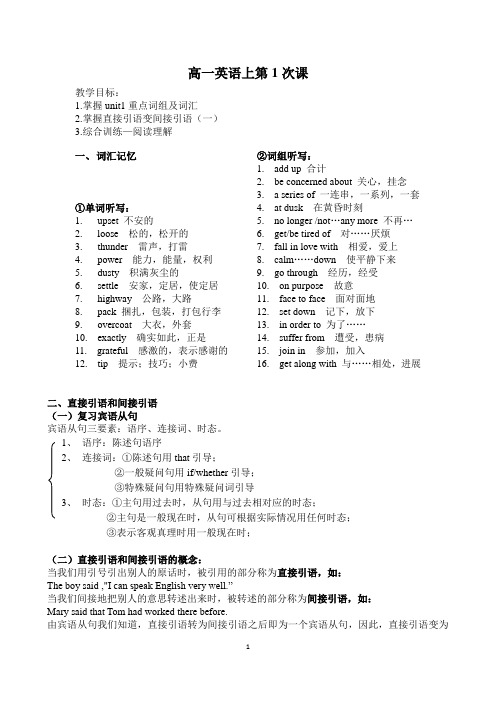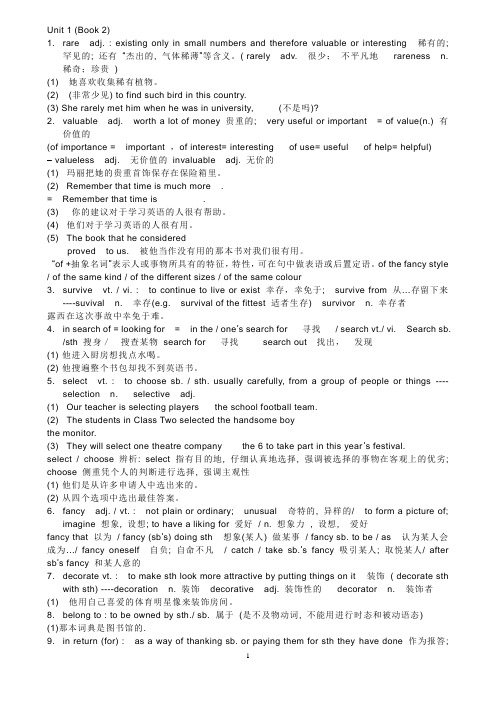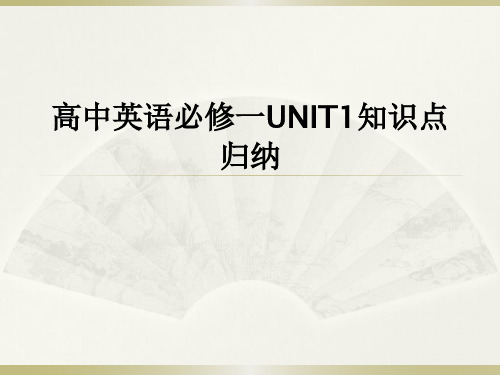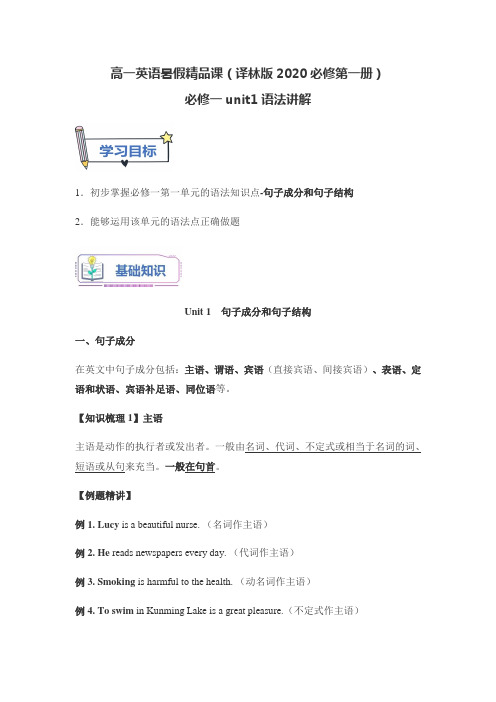必修一unit1语法知识讲解
人教版高中英语必修一Unit1知识点讲解

Unit 1 FriendshipNew words:1.add up合计vt. &vi.①a dd up to + No. 总计为Eg: The numbers add up to exactly 666.数字加起来正好是666. vt.Add up all the money I owe you. vt.Eg: The waiter can’t add up. 他不能算账vi.②a dd up....增添The words add up to myself confidence. 你的话语增添了我的信心/自信。
③a dd ..... to .....Eg: Please add the tea to the milk. 把茶加到牛奶里去。
2. ignore vt. 不理睬;忽视means pay no attention to sb/sth on purpose.故意假装不理睬某人Eg:you can not avoid ignoring my advice on how to study English.你耽误不起忽略我的关于英语学习的建议。
She ignored him and carried on with her works. 她假装没看见他,忽略了他,继续做着她手头上的工作。
3. upset adj. 心烦意乱的;不安的;不适的;vt. 使不安;使心烦adj. be upset about : means be unhappy with something and be disappointed Eg: Your parents are upset about your poor grades. 你的父母亲对你的成绩感到非常的难过和不开心。
be upset that + 从句Eg: She was upset that he had left without a kiss.an upset stomach: means your stomach is uncomfortablevt. upset upsettingEg: Your action upset/annoyed me. 你的行为使我很恼火,很恼怒。
人教必修一Unit1 Discovering Useful Structures 语法精讲

June is the month That carries a tune. Its beautiful melody Floats like a balloon.
Ⅱ NP + AdjP + AdvP
Compare and Find
➢ He speaks very quickly. 修饰__动__词______作_状__语_________ ➢ I am much too happy to see you. 修饰__形__容__词______作__状__语________ ➢ She sings well enough as a singer. 修饰__动__词________作__状__语________ ➢ He worked much more carefully on the new design. 修饰__副__词____作 ___状__语___
短语或词组是具有一定意义但不构成句子或从句的一组词。 二、形容词短语 (AdjP)
Compare and Find
➢ The man is tall and strong. 作__表__语___ ➢ She is a little girl lively and lovely. 作___定__语_______ ➢ He found the movie very interesting. 作宾__语__补__足__语____
NP + AdjP + AdvP
Summary
1. 副词短语在句中作副词用,可以修饰_动__词__、__形__容__词__或__副__词_, 作_状__语___等。
人教版高一英语必修一unit第1次课词汇与语法讲义

高一英语上第1次课教学目标:1.掌握unit1重点词组及词汇2.掌握直接引语变间接引语(一)3.综合训练—阅读理解一、词汇记忆①单词听写:1. upset 不安的2. loose 松的,松开的3. thunder 雷声,打雷4. power 能力,能量,权利5. dusty 积满灰尘的6. settle 安家,定居,使定居7. highway 公路,大路8. pack 捆扎,包装,打包行李9. overcoat 大衣,外套10. exactly 确实如此,正是11. grateful 感激的,表示感谢的12. tip 提示;技巧;小费②词组听写:1. add up 合计2. be concerned about 关心,挂念3. a series of 一连串,一系列,一套4. at dusk 在黄昏时刻5. no longer /not…any more 不再…6. get/be tired of 对……厌烦7. fall in love with 相爱,爱上8. calm……down 使平静下来9. go through 经历,经受10. on purpose 故意11. face to face 面对面地12. set down 记下,放下13. in order to 为了……14. suffer from 遭受,患病15. join in 参加,加入16. get along with 与……相处,进展二、直接引语和间接引语(一)复习宾语从句宾语从句三要素:语序、连接词、时态。
1、语序:陈述句语序2、连接词:①陈述句用that引导;②一般疑问句用if/whether引导;③特殊疑问句用特殊疑问词引导3、时态:①主句用过去时,从句用与过去相对应的时态;②主句是一般现在时,从句可根据实际情况用任何时态;③表示客观真理时用一般现在时;(二)直接引语和间接引语的概念:当我们用引号引出别人的原话时,被引用的部分称为直接引语,如:The boy said ,"I can speak English very well.”当我们间接地把别人的意思转述出来时,被转述的部分称为间接引语,如:Mary said that Tom had worked there before.由宾语从句我们知道,直接引语转为间接引语之后即为一个宾语从句,因此,直接引语变为间接引语时,人称、时态、引导词、状语和语序都会发生变化。
高一英语必修一Unit 1语法总结

Unit 1 (Book 2)1. rare adj. : existing only in small numbers and therefore valuable or interesting 稀有的;罕见的; 还有“杰出的, 气体稀薄”等含义。
( rarely adv. 很少;不平凡地rareness n.稀奇;珍贵)(1) 她喜欢收集稀有植物。
(2) (非常少见) to find such bird in this country.(3) She rarely met him when he was in university, (不是吗)?2. valuable adj. worth a lot of money 贵重的; very useful or important = of value(n.) 有价值的(of importance = important ,of interest= interesting of use= useful of help= helpful)– valueless adj. 无价值的invaluable adj. 无价的(1) 玛丽把她的贵重首饰保存在保险箱里。
(2) Remember that time is much more .= Remember that time is .(3) 你的建议对于学习英语的人很有帮助。
(4) 他们对于学习英语的人很有用。
(5) The book that he consideredproved to us. 被他当作没有用的那本书对我们很有用。
“of +抽象名词”表示人或事物所具有的特征,特性,可在句中做表语或后置定语。
of the fancy style / of the same kind / of the different sizes / of the same colour3. survive vt. / vi. : to continue to live or exist 幸存,幸免于; survive from 从…存留下来----suvival n. 幸存(e.g. survival of the fittest 适者生存) survivor n. 幸存者露西在这次事故中幸免于难。
高中英语必修一UNIT1

4. You had to pay to get it repaired
get sth done 使……完成/让某人做某事
5. You will ignore the bell and go somewhere
quiet to calm your friend down.
I said hello to her, but she ignored me completely!
met her face to face.
25. in one’s power 处于……的控制之中 I have got him in my power. I can ask him to do anything I want. 我控制了他,我可以让他为我做任何事。
语从句中的主语与主句的主语一致时,可将从 句中的主语和be动词省去。 walk sb home/ to a place: 为保证安全而陪某
人去某地 It’s late ---- let me walk you home.
9. take one’s end-of-term exam 参加期末考试 10. Your friend, who doesn’t work hard, asks you to help him cheat in the end-of-term exam.(非限制性定语从句) cheat in the exam 考试作弊 11. look at someone else’s paper 看别人的试卷 12. make a list of reasons 列举一些原因 13. Do you want a friend whom you could tell everything to, like your deepest feelings and thoughts? 你想有一位无话不谈、 能推心置腹的朋友吗? 14. go through遭遇;经历;熬过;用光(钱);获准,通过 It can go through the test of the time. 它能经受时间的考验. She knew that she had got to go through all the difficulties with her family. He would go through fire and water for his country. 他愿为国家 赴汤蹈火。 15. hide away 躲藏;隐藏 16. I don’t want to set down a series of facts in a diary as most people do,…我不愿像大多数人一样在日记中记流水账,……
高一英语暑假精品课(译林版2020必修第一册)必修一unit1语法讲解

高一英语暑假精品课(译林版2020必修第一册)必修一unit1语法讲解1.初步掌握必修一第一单元的语法知识点-句子成分和句子结构2.能够运用该单元的语法点正确做题Unit 1句子成分和句子结构一、句子成分在英文中句子成分包括:主语、谓语、宾语(直接宾语、间接宾语)、表语、定语和状语、宾语补足语、同位语等。
【知识梳理1】主语主语是动作的执行者或发出者。
一般由名词、代词、不定式或相当于名词的词、短语或从句来充当。
一般在句首。
【例题精讲】例1. Lucy is a beautiful nurse. (名词作主语)例2. He reads newspapers every day. (代词作主语)例3. Smoking is harmful to the health. (动名词作主语)例4. To swim in Kunming Lake is a great pleasure.(不定式作主语)例5. What we should do is not yet decided. (从句作主语)【知识梳理2】谓语说明主语“做什么”,“是什么”或“怎么样”。
谓语必须是动词。
谓语和主语在人称【例题精讲】例1. His parents are teachers. (系动词作谓语)例2. We study hard.(行为动词作谓语)例3. We don’t finish reading the book.(助动词和行为动词一起作谓语)例4. He can speak English. (情态动词和行为动词一起作谓语)【知识梳理3】宾语宾语是动作、行为的承受者,由名词、代词、不定式或相当于名词的词、短语或【例题精讲】例1. She is doing her homework now.(名词作宾语)例2. We often help him.(代词作宾语)例3. He likes to play basketball.(不定式作宾语)例4. We enjoy listening to the music. 我们喜欢听音乐。
必修一 Unit 1 Teenage Life 语法知识+读后续写-筑基讲义 -2025年新含解析
必修一Unit 1 Teenage Life 语法知识+读后续写-筑基讲义-2025年一轮总复习筑基培优方案(人教版2019)必修1Unit 1 Teenage LifePart 1 单元语法讲义--短语一、常见短语一)、名词短语(NP)定义:名词短语是指由几个名词或名词及其修饰语构成的短语。
它是英语句子的核心成分。
1.常见名词短语的构成形式有:(1)限定词+名词如:the girl(2)限定词+形容词(短语)+名词如:a beautiful girl(3)限定词+名词+介词短语如:a beautiful campus of my school(4)限定词+描述性名词+名词如:my school life二)、形容词短语形容词短语,是指一个以形容词为中心构成的短语,在句子中的功能相当于形容词,可以修饰名词或代词,还可以用作表语或者宾语补足语。
1.常见形容词短语的构成形式有:(1)副词+形容词如:very suitable(2)形容词+enough如:good enough(3)形容词+介词短语如:good for nothing(4)副词+形容词+介词如:well worthy of praise三)、副词短语以副词为中心词的短语是副词短语。
副词短语的结合方式是:修饰语+副词,有时中心词之后还带有后置修饰语或补足成分。
如:very carefully,pretty soon,far from the station等。
二、名词短语的句法功能:(1)作主语The interesting title of the article attracted a lot of readers.这篇文章有趣的标题吸引了很多读者。
[温馨提示]名词短语作主语时,谓语动词的单复数要与名词短语中的中心词保持一致。
A number of books are on the desk.The number of books is not large.(2)作表语How to fight against such a disease is a hot topic today.怎样与那种疾病作斗争是今天的热点话题。
人教版高一英语必修一Unit1知识点详解
人教版高一英语必修一Unit1知识点详解一、单词1、重点单词讲授。
(1)add① add …to…把…添加…/把…加起来② add up to共计,总共③ add to增加(2)upset过去式:upset过去分词:upset现在分词:upsettingadj.心烦意乱的,不安的,不适的be upset about/over 为某事心烦、不安be upset that心烦vt.使不安,使心烦It upsets sb that让某人心烦的是It upsets sb to do sth 做某事使某人不安(3)concernvt. 使担忧,顾虑,触及,关系到n. 担忧,关注,利害关系①as far as sb/sth + be concerned就某人而言,对于某人来说as far as I am concerned就我而言,对于我来说as far as he is concerned对他来说as far as English is concerned关于英语,对于英语②be concerned about/f or关心,挂念have no concerned about/for③be concernedin/with触及到,与…有关have no concerned in/with(4)go through①经历,遭受,忍受go through one difficulty after another.经历一个又一个困难。
②仔细检查,审查go through your paper 检查你的试卷。
③浏览,翻阅go through all the related reference.浏览相干资料。
④通过,穿过=pass throughgo through a great forest.穿过一片大森林。
⑤完成go through the task.完成任务。
(5)suffer①suffer 作“遭受”时,后面直接接pain, loss, injury, harm或punishment.②suffer 作“受…苦”时,常常搭配:sufferfrom(6)get/be tired of厌烦…get/be/feel tired of sb / sth / doing sth 厌烦be tired from由于…而疲劳(体力上的疲劳),侧重原因be tired out精疲力竭的(7)join in 参加,加入区分join ,join in ,attend 与 take part in:join:多指加入组织,团体,党派等,有作为其中一员的意思。
高一英语必修一unit1知识点
高一英语必修一unit1知识点高中英语必修一Unit 1 知识点梳理一、词汇与短语1. 形容词与副词- 形容词用于描述名词的特征或属性,如:beautiful, interesting, difficult。
- 副词用来修饰动词、形容词或其他副词,表达方式、程度、时间等,如:quickly, usually, very。
2. 常用短语- as soon as possible:尽快地- as…as:和…一样- take place:发生- in order to:为了- be full of:充满- be strict with:对…严格- look forward to:期待二、语法点1. 比较级和最高级- 形容词和副词的比较级和最高级的构成规则,以及它们的基本用法。
- 比较级用于比较两者,最高级用于比较三者以上。
2. 现在完成时- 现在完成时的构成:助动词have/has + 过去分词。
- 现在完成时表示过去发生的动作对现在造成的影响或结果,或者从过去开始一直持续到现在的动作。
3. 一般现在时- 一般现在时的构成:主语 + 动词原形/第三人称单数形式。
- 一般现在时用于描述经常发生的动作、习惯、事实或状态。
三、阅读理解技巧1. 快速浏览(Skimming)- 快速浏览文章,抓住文章的主旨大意。
- 通过标题、图片、段落首句和尾句等信息进行判断。
2. 寻找主题句- 主题句通常位于段落的开头,概括了该段落的主要内容。
- 通过主题句可以更好地理解段落的核心思想。
3. 推理判断- 根据上下文线索,推断生词或难句的意思。
- 通过逻辑关系和文章结构进行推理。
四、写作技巧1. 开头引入- 使用引人入胜的开头,如引用名言、提出问题或描述一个场景。
- 开头应简洁明了,直接引入文章主题。
2. 正文论述- 按照逻辑顺序组织文章,每个段落只讨论一个中心点。
- 使用恰当的连接词,使文章结构清晰,逻辑性强。
3. 结尾总结- 总结文章的主要观点,重申文章的中心思想。
人教版高中英语必修一语法知识点总结
人教版高中英语必修一语法知识点总结高中英语必修一作为学习高中英语的基础课程,学好这部分的知识就是在为高考铺路,下面是小编给大家带来的人教版高中英语必修一语法知识点总结,希望能够帮助到大家!人教版必修一各单元知识点总结Unit One Friendship一、重点短语1.go through 经历,经受get through 通过;完成;接通电话2. set down 记下,放下3. a series of 一系列4. on purpose 有目的的5. in order to 为了6. at dusk 傍晚,黄昏时刻7. face to face 面对面8. fall in love 爱上9. join in 参加(某个活动);take part in 参加(活动)join 加入(组织,团队,并成为其中一员)10. calm down 冷静下来11. suffer from 遭受12. be/get tired of…对…感到厌倦13. be concerned about 关心14. get on/along well with 与…相处融洽15. be good at/do well in 擅长于…16. find it + adj. to do sth. 发现做某事是…17. no longer / not …any longer 不再…18. too much 太多(后接不可数n.)much too 太…(后接adj.)19. not…until 直到… 才20. it’s no pleasure doing sth 做… 并不开心21. make sb. sth. 使某人成为…make sb. do sth. 使某人做某事二、语法----直接引语和间接引语概念:直接引语:直接引述别人的原话。
一般前后要加引号。
间接引语:用自己的话转述别人的话。
间接引语在多数情况下可构成宾语从句且不要加引号。
- 1、下载文档前请自行甄别文档内容的完整性,平台不提供额外的编辑、内容补充、找答案等附加服务。
- 2、"仅部分预览"的文档,不可在线预览部分如存在完整性等问题,可反馈申请退款(可完整预览的文档不适用该条件!)。
- 3、如文档侵犯您的权益,请联系客服反馈,我们会尽快为您处理(人工客服工作时间:9:00-18:30)。
人称的变化 :一随主,二随宾,第三人称不更新
口诀
说明
直接引语
间接引语
一 引号内的第一人
随 称变间引后与主 She said,“ I like She said that she
主 句主语的人称保 Tennis.”
liked tennis.
持一致
二 引号内的第二人 He said to Lily, He told Lily that
直接引语中的助动词 shall should will would may might can could must
间接引语中的助动词 should
should(不变) would
would(不变) might
might(不变) could
could(不变) must / had to
I am good at dancing.
必修一unit1语法
在直接引语变为间接引语时需要注意的变化
1. 注意时态的变化
主(句)过(去时)从(句)限过(去时), 主现从不限, 真理永不变
2. 注意语序变化 陈述语序
3.注意引导词的选择
肯定句that、一般疑问句if/whether、wh—特殊疑问句
4. 注意人称、指示代词、时间、地点及个别趋向 动词的变化
随 称变间引后与主 “ you must get she must get up
宾 句宾语的人称保 up early.”
early.
持一致
三 引号内的第三人 She said to me , She told me that
不 称在变间引后人 “ They want to they wanted to
Be quiet! He ordered/told
me to be quiet!
结论
直接引语是疑问句,变间接引语时, 要从疑问语序变为陈述语序。
直接引语是一般疑问句,变为间接引语
时,用连词if或whether连接。
直接引语是特殊疑问句,变为间接引语 时,仍用原来的疑问词作连词来引导。
结论
直接引语是祈使句,变成间接引语,把 动词原形变成动词不定式;否定句,在动 词不定式前加not或never. 并根据语气的不同在动词不定前加tell, ask, order ,beg ,advise等动词。
Where are you She asked me
going for your where I were going
holiday?
for my holiday.
Follow me, please!
Don’t make noise!
He asked me to follow him.
He ordered/told me not to make noise.
一般疑问句 •间接引语用连词whether或if引导,原主句中 谓语动词said要改为asked (me/him/us等),语 序是陈述句的语序。
He said, “Do you have any difficulty with pronunciation?” He asked (me) whether/if I had any difficulty with my pronunciation. He said, “You are interested in English, aren't you?” He asked whether I was interested in English.
He said (to us) that he had been to the Great Wall.
He said, “I'll give you an examination next Monday.”
He told us that he would give us an examination the next Monday.
3) She asked, “What are you doing?” → She asked me what I was doing.
陈述句
用连词that引导,that在口语中常省略。主句的 谓语动词可直接用引语中的said, 也可用told来 代替。注意,可以说said that, said to sb. that, told s have been to the Great Wall.”
转换步骤:
“I don’t like computers,” Sarah said to her friends.
Sarah said to her friends that I don’t like
computers. Sarah said
she
didn’t
Sarah said to her friends that she didn’t like computers.
1. 转述他人的陈述→陈述句 2. 转述他人的疑问→一般疑问句 3. 转述他人的问题→特殊疑问句 1) He said , “I’m going to Beijing.” → He said that he was going to Beijing.
2) He asked, “Are you a teacher?” → He asked me if /whether I was a doctor.
here come, bring
间接引语
that, those then, that day
that week the day before the week before four days before
two days before
the next day the next month
there go, take
变 称不变
help him.”
help him.
指示代词
时 间 状 语
地点状语 方向性动词
直接引语
this, these now, today
this week yesterday last week four days ago the day before yesterday tomorrow next month
She said she was good at dancing.
I visited the Great Wall yesterday.
She said she had visited the Great Wall the day before.
Do you like flowers?
She asked me whether/if I liked flowers?
